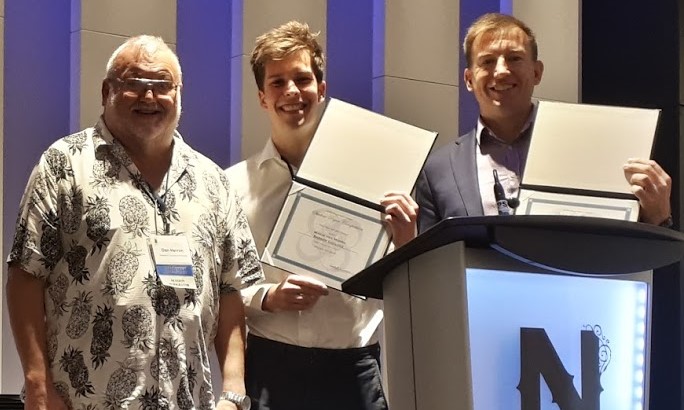Recent Babson alumnus, Maxim Van Hoorn (’19), wins award for research on law and technology (blockchain and DAOs)

Maxim (Max) Van Hoorn was a finalist in the undergraduate student research competition of the Academy of Legal Studies in Business (ALSB), the premier international association of legal scholars at business schools. He presented his research, took questions from professors, and, based on the quality of his paper and presentation, was one of three award recipients.
Max explains: “I submitted a part of my Honors thesis on the Accountability of Decentralized Autonomous Organizations, which I wrote under the supervision of Professor Steven Gordon. This trip was a great experience for me personally, and I would recommend it for any students that would like to gain more experience competing in an academic setting while also enjoying some time in a different part of the world.”
Describing his research, Max elaborates: “the paper that I wrote dealt with the aspects of accountability and legal responsibility of participants who decide to participate in organizations on the blockchain. Blockchain technology has huge potential to shift the paradigm of how we govern ourselves and transfer value, but it also has some short term limitations. A permissionless and decentralized organization that is facilitated by the blockchain allows anyone to join it. This means that even unknown parties or parties from different jurisdictions can join them, which makes it very difficult to determine who is responsible when something goes wrong. In my research, I looked at the current literature and collected primary data through interviews. After compiling my data, I analyzed the different arguments put forward to see how realistic they were. I concluded with suggesting the most likely scenario of how accountability on decentralized autonomous organizations can be approached.”
Based on my own research on the legal implications of blockchain, published in the Wayne Law Review (forthcoming, with Joan MacLeod Heminway) and the Delaware Journal of Corporate Law (and more, forthcoming), Max’s conclusions seem reasonable. However, what perhaps most impressed some of our colleagues in attendance was Max’s initiative to seek out and interview experts in the world of practice for their opinions.
Regarding his overall experience, Max adds: “I had a lot of freedom [in terms of] what I wanted to do. The schedule was very flexible, and I could sit in … on other presentations by professors who applied law in different ways and in different fields. I could also walk around in Montreal and enjoy myself. I would like to give a big thank you to Professor Sulkowski for enabling me to participate.”
Speaking for myself, I would like to thank Babson colleagues Leslie Garbarino and Cheryl Kirschner for also supporting and advising Max ahead of his presentation and Q&A session at the conference. It is always impressive and gratifying to see our students step-up to the challenge of discussing their work in front of career scholars.
